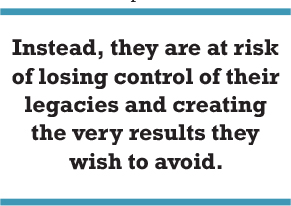
Bob Carlson's - Protect Your Legacy by Taking the Steps Most People Don’t

Protect Your Legacy by Taking the Steps Most People Don’t
Most Americans know the legacy they want to leave, but few take even the minimal steps to ensure that legacy. A legacy is what you leave behind, especially to heirs and loved ones. A legacy can include things, such as money, property and other tangible items. Some of these items might have monetary value while others have mostly emotional value.
A legacy also can include the intangible, such as values, life lessons and final wishes and instructions. Americans ages 55 and older generally agree on the legacies they want to leave.

Protecting loved ones and making things easier for them are the top priorities, according to a study by Merrill Lynch and Age Wave. These desires have several components. People don’t want to be a burden on loved ones in their later years. First, they want to avoid imposing a financial burden on their children and others. Second, they want to relieve their children of the trouble of providing care and making difficult decisions.
Another and related priority is to live in dignity in their later years. About 43% of those in the study worry they won’t have anyone to be an advocate for them so they can age with dignity.
Almost everyone wants these to be elements of his or her legacy. What’s striking, however, in this survey and others is the slight amount of preparation many people have done to create the legacy they want. Instead, they are at risk of losing control of their legacies and creating the very results they wish to avoid.
Essential steps in a legacy plan ensure that you are well cared for in your later years, even if you become unable to take care of yourself fully or make good decisions on your behalf.
A good first step is to plan how care will be financed. Begin with ensuring you have broad medical insurance. Medicare doesn’t cover everything. You can choose a package of original Medicare, prescription drug insurance and Medicare supplement insurance. Or you can opt for a Medicare Advantage plan. Review our October 2019 and November 2019 issues for details of how to find the best coverage for you.
Then, determine how any longterm care (LTC) you need will be paid for. Most people now want to receive LTC in their homes. Technology and other innovations are making that possible for more and more people. Others eventually will spend time in assisted living or memory care residences.
Don’t underestimate the probability you’ll need this type of assistance. In a married couple in which both are age 65 today, at least one spouse is likely to live into his or her 90s. Some of you will be able to pay for this care from income or retirement assets. Others should buy insurance to fund at least part of the care. You can buy traditional long-term care insurance. But that has fallen out of favor because of rising premiums and concerns the insurers might not remain viable.
A more popular option is an annuity or life insurance policy with an LTC rider. These also are known as hybrid policies and asset-based LTC policies. I’ve recommended these types of policies, including specific policies to consider. See the June 2019 and July 2013 issues for details. Whether an annuity or life insurance policy is best depends on your goals and other factors.
I recommend contacting David Phillips or Todd Phillips at Phillips Financial Services (888-892-1102) to discuss your situation and the protection available to you. Phillips Financial Services has an advantage over most other insurance agents and brokers because David and Todd work with almost all insurers to find the best products instead of focusing on one or a small number of insurers.
Another key step to ensuring your legacy is to put the key paperwork in place. It is essential to have an advance medical directive and health care power of attorney, also known as a health care proxy.
You should have someone to help you make medical decisions or to make them for you. It can be one person or a group of persons. Federal privacy law makes it very important to have these plans in place, because medical providers aren’t allowed to use the informal processes of the past. Most people know one or two people they want to help with these decisions and other people they prefer not to have involved. I hear many people say they haven’t prepared these documents because, “I’m not there yet.” That’s why you need to put the plan in place now. When you’re “there” it will be too late to arrange things the way you want.
For more details about these key tools, review our February 2017 issue. Likewise, you also need a durable power of attorney. At some point it’s likely that someone should help you make financial decisions or even take over management of your finances.
You should want this to be a person or group of people you selected. Your legacy won’t be a good one if no financial actions can be taken while your loved ones ask a court to have a guardian or conservator appointed to pay bills and manage your finances. This is likely to cost money and be embarrassing to everyone involved.

For more details about the durable power of attorney, review our January 2017 and September 2017 issues. When you have a living trust holding some or all of your assets, be sure a plan for a successor trustee is in place. You might want to have the successor trustee at some point serve as co-trustee to help you. That also helps the trustee become familiar with your finances and be introduced to the financial firms you do business with.
Of course, you also need a will. I won’t spend time explaining why a will is essential. You know the reasons.
Many people procrastinate about preparing a will because they aren’t sure about some details. The best step is to put at least a basic will in place. That ensures most of your wealth goes where you want and your loved ones are protected. They won’t have to waste time and money because you didn’t have a will. Later, you can give more consideration to some of the issues and amend the will or have a new one prepared.
Though most people want to leave a certain legacy and know the importance of preparing for it, I find most people don't take these simple, essential steps. Often, it’s because they fear the unknown or believe setting up their legacy will be more complicated and expensive than it is. Instead of being overwhelmed by everything that needs to be done and decided, break the process into smaller steps and tackle them over time.
We’re early in the new year and new decade. Commit yourself to beginning the creation of the legacy your want and having the essential pieces in place by the end of the year.




